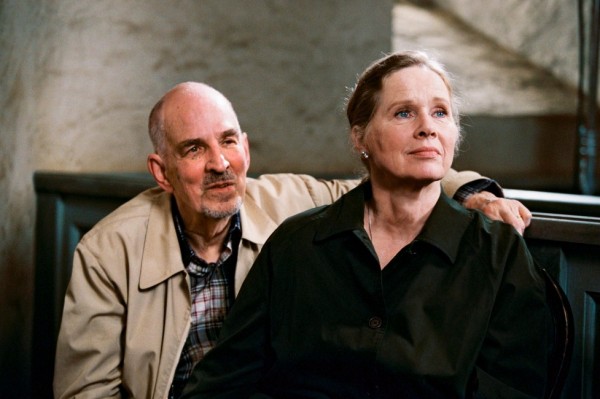THE ACT OF KILLING (Joshua Oppenheimer, 2012)
Film Society of Lincoln Center
Elinor Bunin Munroe Film Center, Howard Gilman Theater
Thursday, December 26, 1:30
Series runs December 20-26
212-875-5601
www.filmlinc.com
www.theactofkilling.com
 Joshua Oppenheimer’s The Act of Killing is one of the most disturbing, and unusual, films ever made about genocide. In 1965-66, as many as a million supposed communists and enemies of the state were killed in the aftermath of a military coup in Indonesia. Nearly fifty years later, many of the murderers are still living in the very neighborhoods where they committed the atrocities, openly boasting about what they did, being celebrated on television talk shows, and even being asked to run for public office. While making The Globalization Tapes in Indonesia in 2004, the Texas-born Oppenheimer met some of these self-described gangsters and, struck by their brash, bold attitudes, decided to create a different kind of documentary. In addition to following them around as they go bowling, play golf, sing, and dance, proudly showing off how happy their lives are, Oppenheimer offered them the opportunity to tell their story as if it were a Hollywood movie. The men, whose love of American noir and Westerns heavily influenced the stylized killings they perpetrated, loved the idea and began to restage torture and murder scenes in great detail for the camera, getting in period costumes, putting on makeup, going over script details, reviewing the dailies, and playing both the violent criminals and their victims. The leader is master executioner Anwar Congo, who is perhaps the only one haunted by his deeds; although on the surface he is proud of what he did, he is tormented by constant nightmares. Such is not the case for the others, who laugh as they go over the gory details, especially paramilitary leader Herman Koto, Congo’s protégé and a man seemingly without a conscience. Meanwhile, fellow executioner Adi Zulkadry wonders whether telling the truth will actually negatively impact their legendary status. “Human rights! All this talk about ‘human rights’ pisses me off,” Congo says in one scene. “Back then there was no human rights.” Oppenheimer also depicts how frighteningly powerful the three-million-strong, government-connected Pancasila Youth is, ready to fight for the very same things that led to the genocide in the first place. It’s hard to comprehend how these men continue to walk free, and one can argue whether Oppenheimer should indeed be giving them the platform that he does. Watching these gangsters — or “free men,” as they like to call themselves, since the Indonesian word for gangster is “preman,” derived from the Dutch “vrijman” — artistically re-create scenes of horrific violence is both illuminating and infuriating on multiple levels that will leave viewers angry and incredulous. A selection of this year’s Human Rights Watch Film Festival, The Act of Killing is screening December 26 at 1:30 as part the Film Society of Lincoln Center series “For Your Consideration: Documentary Oscar Hopefuls,” which consists of all fifteen nonfiction features that have made the Academy Awards short-list; the festival will be followed December 27 – January 2 by “For Your Consideration: Foreign Oscar Hopefuls,” comprising such international fare as Wong Kar-wai’s The Grandmaster, Thomas Vinterberg’s The Hunt, Kleber Mendonça Filho’s Neighboring Sounds, and Haifaa Al Mansour’s Wadjda.
Joshua Oppenheimer’s The Act of Killing is one of the most disturbing, and unusual, films ever made about genocide. In 1965-66, as many as a million supposed communists and enemies of the state were killed in the aftermath of a military coup in Indonesia. Nearly fifty years later, many of the murderers are still living in the very neighborhoods where they committed the atrocities, openly boasting about what they did, being celebrated on television talk shows, and even being asked to run for public office. While making The Globalization Tapes in Indonesia in 2004, the Texas-born Oppenheimer met some of these self-described gangsters and, struck by their brash, bold attitudes, decided to create a different kind of documentary. In addition to following them around as they go bowling, play golf, sing, and dance, proudly showing off how happy their lives are, Oppenheimer offered them the opportunity to tell their story as if it were a Hollywood movie. The men, whose love of American noir and Westerns heavily influenced the stylized killings they perpetrated, loved the idea and began to restage torture and murder scenes in great detail for the camera, getting in period costumes, putting on makeup, going over script details, reviewing the dailies, and playing both the violent criminals and their victims. The leader is master executioner Anwar Congo, who is perhaps the only one haunted by his deeds; although on the surface he is proud of what he did, he is tormented by constant nightmares. Such is not the case for the others, who laugh as they go over the gory details, especially paramilitary leader Herman Koto, Congo’s protégé and a man seemingly without a conscience. Meanwhile, fellow executioner Adi Zulkadry wonders whether telling the truth will actually negatively impact their legendary status. “Human rights! All this talk about ‘human rights’ pisses me off,” Congo says in one scene. “Back then there was no human rights.” Oppenheimer also depicts how frighteningly powerful the three-million-strong, government-connected Pancasila Youth is, ready to fight for the very same things that led to the genocide in the first place. It’s hard to comprehend how these men continue to walk free, and one can argue whether Oppenheimer should indeed be giving them the platform that he does. Watching these gangsters — or “free men,” as they like to call themselves, since the Indonesian word for gangster is “preman,” derived from the Dutch “vrijman” — artistically re-create scenes of horrific violence is both illuminating and infuriating on multiple levels that will leave viewers angry and incredulous. A selection of this year’s Human Rights Watch Film Festival, The Act of Killing is screening December 26 at 1:30 as part the Film Society of Lincoln Center series “For Your Consideration: Documentary Oscar Hopefuls,” which consists of all fifteen nonfiction features that have made the Academy Awards short-list; the festival will be followed December 27 – January 2 by “For Your Consideration: Foreign Oscar Hopefuls,” comprising such international fare as Wong Kar-wai’s The Grandmaster, Thomas Vinterberg’s The Hunt, Kleber Mendonça Filho’s Neighboring Sounds, and Haifaa Al Mansour’s Wadjda.

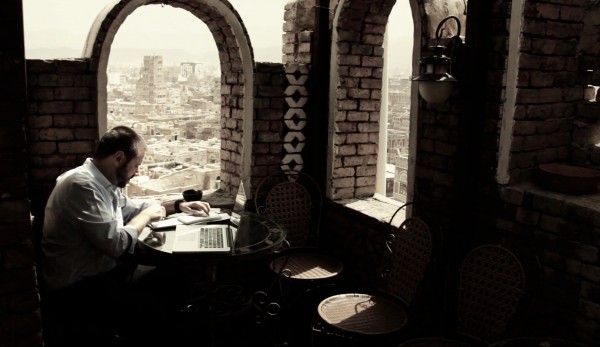
 In 2007, investigative journalist Jeremy Scahill published Blackwater: The Rise of the World’s Most Powerful Mercenary Army, which detailed his reporting for the Nation on the controversial private military force hired by the U.S. government to fight in Iraq. Six years later, Scahill has written Dirty Wars: The World Is a Battlefield, a scathing indictment of another secretive fighting force, the Joint Special Operations Command. Director Rick Rowley (The Fourth World War, This Is What Democracy Looks Like) follows Scahill through Afghanistan, Yemen, Somalia, and Washington in this eponymous documentary accompanying the book as Scahill uncovers startling information about JSOC and the White House involving kill lists, mysterious night raids and drone strikes, attacks on U.S. citizens, and other controversial elements of the War on Terror. Rowley meets with former operatives who discuss JSOC’s rising power, villagers in Afghan and Yemen who claim U.S. forces murdered innocent women and children based on faulty intelligence, the father of targeted Islamic militant Anwar al-Awlaki, and U.S.-backed warlords who have no regard for the international rules of engagement. Every time Scahill appears to have reached a dead end in his investigation, he uncovers something that keeps him going, knowing it could get him into deep trouble. At one point a clip shows Jay Leno asking Scahill on Bill Maher’s Real Time, “Why are you still alive?” As inappropriate a question as that is, it is loaded with truth. No matter what your political bent, it is extremely difficult to watch Dirty Wars, as it reveals many unsettling facts about America and the War on Terror that will have even the most left-leaning viewers wondering whether Scahill should just have just left well enough alone. Photographed by Rowley and written by the director with Scahill and David Riker, Dirty Wars is screening December 26 at 6:30 as part of the Film Society of Lincoln Center series “For Your Consideration: Documentary Oscar Hopefuls,” which runs December 20-26 and consists of all fifteen nonfiction features that have made the Academy Awards short-list, including Blackfish, The Act of Killing, Life According to Sam, The Crash Reel, First Cousin Once Removed, and Which Way Is the Front Line from Here? The festival will be followed December 27 – January 2 by “For Your Consideration: Foreign Oscar Hopefuls,” comprising such international fare as Wong Kar Wai’s The Grandmaster, Thomas Vinterberg’s The Hunt, Kleber Mendonça Filho’s Neighboring Sounds, and Haifaa Al Mansour’s Wadjda.
In 2007, investigative journalist Jeremy Scahill published Blackwater: The Rise of the World’s Most Powerful Mercenary Army, which detailed his reporting for the Nation on the controversial private military force hired by the U.S. government to fight in Iraq. Six years later, Scahill has written Dirty Wars: The World Is a Battlefield, a scathing indictment of another secretive fighting force, the Joint Special Operations Command. Director Rick Rowley (The Fourth World War, This Is What Democracy Looks Like) follows Scahill through Afghanistan, Yemen, Somalia, and Washington in this eponymous documentary accompanying the book as Scahill uncovers startling information about JSOC and the White House involving kill lists, mysterious night raids and drone strikes, attacks on U.S. citizens, and other controversial elements of the War on Terror. Rowley meets with former operatives who discuss JSOC’s rising power, villagers in Afghan and Yemen who claim U.S. forces murdered innocent women and children based on faulty intelligence, the father of targeted Islamic militant Anwar al-Awlaki, and U.S.-backed warlords who have no regard for the international rules of engagement. Every time Scahill appears to have reached a dead end in his investigation, he uncovers something that keeps him going, knowing it could get him into deep trouble. At one point a clip shows Jay Leno asking Scahill on Bill Maher’s Real Time, “Why are you still alive?” As inappropriate a question as that is, it is loaded with truth. No matter what your political bent, it is extremely difficult to watch Dirty Wars, as it reveals many unsettling facts about America and the War on Terror that will have even the most left-leaning viewers wondering whether Scahill should just have just left well enough alone. Photographed by Rowley and written by the director with Scahill and David Riker, Dirty Wars is screening December 26 at 6:30 as part of the Film Society of Lincoln Center series “For Your Consideration: Documentary Oscar Hopefuls,” which runs December 20-26 and consists of all fifteen nonfiction features that have made the Academy Awards short-list, including Blackfish, The Act of Killing, Life According to Sam, The Crash Reel, First Cousin Once Removed, and Which Way Is the Front Line from Here? The festival will be followed December 27 – January 2 by “For Your Consideration: Foreign Oscar Hopefuls,” comprising such international fare as Wong Kar Wai’s The Grandmaster, Thomas Vinterberg’s The Hunt, Kleber Mendonça Filho’s Neighboring Sounds, and Haifaa Al Mansour’s Wadjda.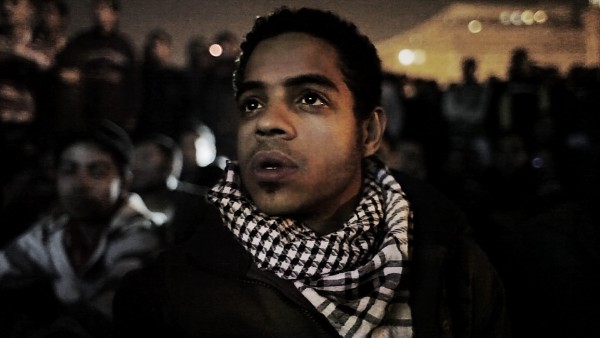
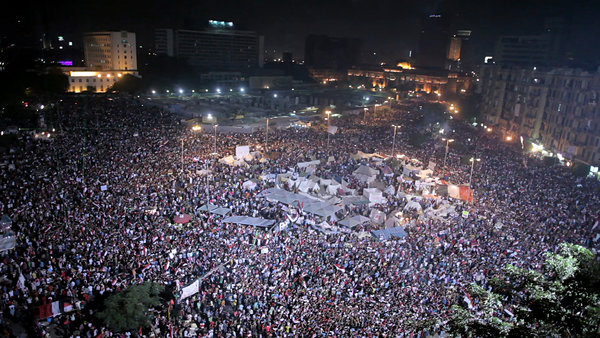
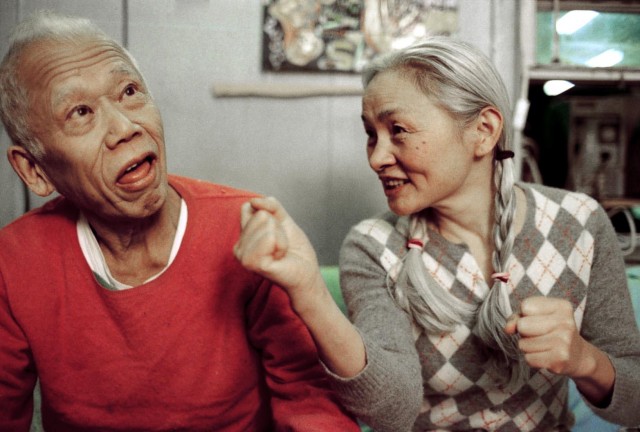
 Zachary Heinzerling’s
Zachary Heinzerling’s 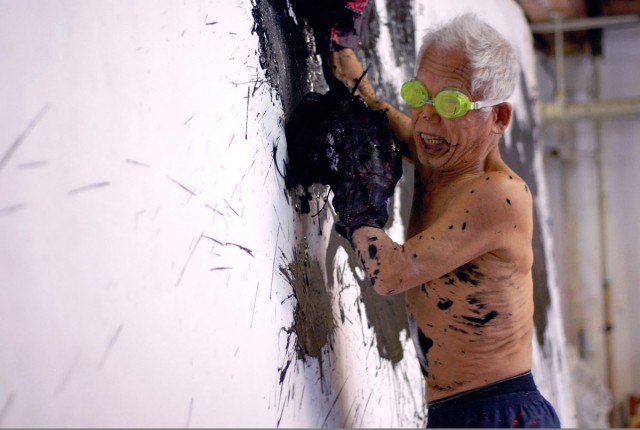

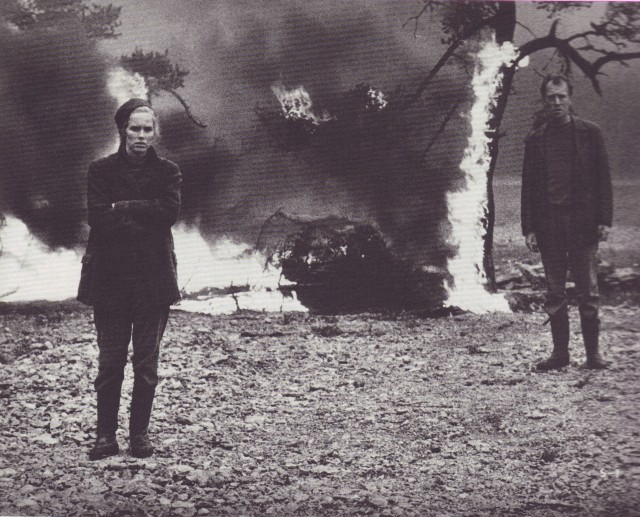
 Ingmar Bergman’s Shame is a brilliant examination of the physical and psychological impact of war, as seen through the eyes of a happily married couple who innocently get caught in the middle of the brutality. Jan (Max von Sydow) and Eva Rosenberg (Liv Ullmann) have isolated themselves from society, living without a television and with a broken radio, maintaining a modest farm on a relatively desolate island a ferry ride from the mainland. As the film opens, they are shown to be a somewhat ordinary husband and wife, brushing their teeth, making coffee, and discussing having a child. But soon they are thrust into a horrific battle between two unnamed sides, fighting for reasons that are never given. As Jan and Eva struggle to survive, they are forced to make decisions that threaten to destroy everything they have built together. Shot in stark black-and-white by master cinematographer Sven Nykvist, Shame is a powerful, emotional antiwar statement that makes its point through intense visual scenes rather than narrative rhetoric. Jan and Eva huddle in corners or nearly get lost in crowds, then are seen traversing a smoky, postapocalyptic landscape riddled with dead bodies. Made during the Vietnam War, Shame is Bergman’s most violent, action-filled film; bullets can be heard over the opening credits, announcing from the very beginning that this is going to be something different from a director best known for searing personal dramas. However, at its core, Shame is just that, a gripping, intense tale of a man and a woman who try to preserve their love in impossible times. Ullmann and von Sydow both give superb, complex performances, creating believable characters who will break your heart. Shame is screening December 14 and 18 at the Elinor Bunin Munroe Film Center as part of the Film Society of Lincoln Center series “Liv & Ingmar: The Films,” being held in conjunction with the theatrical release of Dheeraj Akolkar’s poetic new documentary, Liv & Ingmar; the festival continues with such other Ullmann/Bergman pairings as Scenes from a Marriage, Saraband, The Passion of Anna, and Persona.
Ingmar Bergman’s Shame is a brilliant examination of the physical and psychological impact of war, as seen through the eyes of a happily married couple who innocently get caught in the middle of the brutality. Jan (Max von Sydow) and Eva Rosenberg (Liv Ullmann) have isolated themselves from society, living without a television and with a broken radio, maintaining a modest farm on a relatively desolate island a ferry ride from the mainland. As the film opens, they are shown to be a somewhat ordinary husband and wife, brushing their teeth, making coffee, and discussing having a child. But soon they are thrust into a horrific battle between two unnamed sides, fighting for reasons that are never given. As Jan and Eva struggle to survive, they are forced to make decisions that threaten to destroy everything they have built together. Shot in stark black-and-white by master cinematographer Sven Nykvist, Shame is a powerful, emotional antiwar statement that makes its point through intense visual scenes rather than narrative rhetoric. Jan and Eva huddle in corners or nearly get lost in crowds, then are seen traversing a smoky, postapocalyptic landscape riddled with dead bodies. Made during the Vietnam War, Shame is Bergman’s most violent, action-filled film; bullets can be heard over the opening credits, announcing from the very beginning that this is going to be something different from a director best known for searing personal dramas. However, at its core, Shame is just that, a gripping, intense tale of a man and a woman who try to preserve their love in impossible times. Ullmann and von Sydow both give superb, complex performances, creating believable characters who will break your heart. Shame is screening December 14 and 18 at the Elinor Bunin Munroe Film Center as part of the Film Society of Lincoln Center series “Liv & Ingmar: The Films,” being held in conjunction with the theatrical release of Dheeraj Akolkar’s poetic new documentary, Liv & Ingmar; the festival continues with such other Ullmann/Bergman pairings as Scenes from a Marriage, Saraband, The Passion of Anna, and Persona.